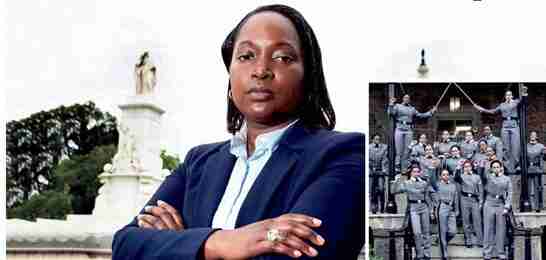By ERRIN HAINES WHACK Associated Press
Self-expression is hardly a part of life for cadets at the United States Military Academy.
So it was far from ordinary when 16 black women put their own spin on the traditional graduation photo, hoisting their fists in the air while posing in their dress uniforms, swords at their sides.
A social media firestorm followed. So did an internal inquiry at the school. Some viewed the cadets’ pose as a gesture of racial solidarity and strength. Others questioned whether it was a statement of support for Black Lives Matter.
West Point officials decided last week that the photo was not politically motivated and no punishment was warranted. Still, that outcome left some black female graduates confused: Why would anyone see controversy in how those 16 women celebrated their experience in the Long Gray Line?
“When I saw it, I said, ‘I wish me and my classmates had taken a picture like that,’” said Shalela Dowdy, a 2012 graduate and a friend of some of the women in the photograph. “But something clicked in my mind that not too many people would be happy about that picture. The fist stands for unity and solidarity, but some people are going to take this the wrong way.”
None of the 16 women would agree to be interviewed for this story. Speaking through black alumnae, they cited a need to focus on their graduation next Saturday, when Vice President Joe Biden will give the commencement address, and life after West Point. For some, that will mean active duty service in the Army. They will become Army officers after leaving the academy.
The picture was one of several the women took in their traditional dress uniforms. A different photo, without the raised firsts, was tweeted by the chairwoman of West Point’s Board of Visitors.
Mary Tobin, who has mentored other black female cadets since graduating in 2003, said few are inclined to discuss their experiences publicly. “To be a black woman at West Point is essentially to make a choice going in … that the majority of the time, you can never fully express your womanhood or your blackness,” Tobin said. “We’re told we’re all green. We don’t ever talk about it, because it’s hard enough for everyone at West Point to graduate.”
The cadets pictured are joining a rare but proud group of black women who have broken barriers on dual fronts at West Point. In interviews with The Associated Press, black alumnae describe a rewarding experience with challenges that included navigating racial incidents.
Established in 1802, West Point went co-ed in 1976. Four years later, there were 62 female graduates. In that class were the first black female graduates, Joy Dallas and Priscilla “Pat” Walker Locke. West Point has graduated 357 black women in its 214-year history, and the Class of 2016 includes 18 black women.
Blacks have contributed to West Point’s legacy for centuries, from the first African-American cadet, Henry O. Flipper, who graduated in 1877, to 2nd Lt. Emily Perez, a black woman who was the first member of the “Class of 9/11” to die in combat, in 2006.
According to admissions director Col. Deborah McDonald, about 15,000 students apply to West Point each year, and about nine percent enroll. There were 1,859 black applicants for the incoming freshman class, and 14 percent of them were accepted, McDonald said.
West Point’s numbers are mirrored at the other U.S. military service academies. The Naval Academy in Annapolis, Maryland, counts 20 women who identify as African American in its 2016 graduating class of 1,215. The Air Force Academy in Colorado Springs, Colorado, has a graduating class of 827, of whom 11 are African-American women. The Coast Guard Academy, in New London, Connecticut, didn’t have a gender breakdown by race, but said three students identifying as African-American are in the graduating class of 186.










No Comment